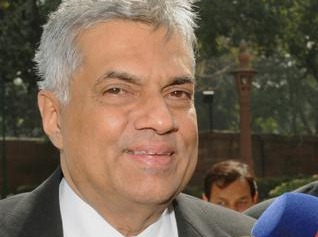 The leader of the newly-floated 18-party United National Front (UNF), Ranil Wickremesinghe, has said that the nomination of the just retired General Sarath Fonseka as a consensus Presidential candidate of the alliance to take on the Sri Lankan President, Mahinda Rajapaksa, is conditional.
The leader of the newly-floated 18-party United National Front (UNF), Ranil Wickremesinghe, has said that the nomination of the just retired General Sarath Fonseka as a consensus Presidential candidate of the alliance to take on the Sri Lankan President, Mahinda Rajapaksa, is conditional.
The retired General, who led the war against the LTTE and sought pre-mature retirement from the military citing 16 reasons, has been asked by the opposition grouping to endorse its ten-point ‘policy’ statement.
The former Prime Minister’s public revelation of the agenda — to which the retired General is required to adhere to in order to secure the backing of the opposition alliance — came as the Cabinet, presided over by President Mahinda Rajapaksa on Wednesday evening, discussed dates for the Presidential and Parliamentary elections.
Formal announcement expected
A formal announcement on the Presidential and Parliamentary elections is expected in the next two to three days. Political and diplomatic observers here have billed the Presidential election as the mother of all political battles in the 48-year-old history of the island nation, as, for the first time, there is a prospect of an incumbent President and Supreme Commander of the armed forces and retired Army Chief and a former commander of the Army being pitted against each other.
Leading political opponents of Mr. Rajapaksa have been openly discussing the prospect of picking the man who led the war against the LTTE as their consensus candidate in the event of a race to the President’s office. While Mr. Rajapaksa is all geared-up, the Opposition parties are still in the process of consulting one another on a strategy to defeat him with or without General Fonseka.
The first test for both Gen. (retd) Fonseka and the new opposition alliance would be an agreement on the 10-point common minimum programme.
Conditions by UNF
The conditions put forward by the UNF for the retired General, if he wants to be considered as their consensus Presidential candidate, include the scrapping of, or substantially reducing, the powers of the executive presidency, provision to the Tamil National Alliance (TNA) and Janatha Vimukhthi Peramuna (JVP) important portfolios in the Cabinet, ensuring the speedy resettlement of the northern IDPs, establishing all the independent commissions for good governance and appointment of Mr. Wickremesinghe as the caretaker Prime Minister.
Mr. Wickremesinghe said that a decision on the Presidential candidate would be taken only after an election was announced and he was confident that Gen. (retd) Fonseka had a clear understanding of the UNF policies.
“There is no reason to assume that General Fonseka is not a democrat,” he said.
Further, in the event of parliamentary polls preceding a Presidential Election, Mr. Wickremesinghe would be the Prime Ministerial candidate of the new Front.
Abolish crossover provision
On the lacuna in the current Constitution, which has been exploited by Parliamentarians to walk over to the party of their whim, Mr. Wickremesinghe said that a future UNF administration would delete that clause in the Constitution.
“We have to sit down and discuss the details, but are agreed in principle that the crossover provision has to be abolished totally,” he said, in response to a question by the local media when questioned if the UNF would ensure that the liberty of crossing over would be denied to both government and Opposition MPs.
On paper, the members elected on a party ticket have to abide by the party whip inside the Parliament. However, there has been a controversy over interpretation of the provision. Today, most of the high-profile Ministers in the Rajapaksa government are members of the main opposition party, United National Party (UNP) and cases by the party against them for deserting the boat are pending in the apex court.
The 19th Amendment to the Constitution presented to Parliament on September 19, 2002 by the then President, Chandrika Kumaratunga, was intended to restrict the President’s power to dissolve parliament after it completes one year and to enable Parliament Members to vote according to their conscience, without being expelled by political parties.
Both amendments to the Constitution were challenged before the Supreme Court which determined that the Bill that enables MPs to vote according to their conscience, without being expelled by political parties, cannot be validly enacted by Parliament.
Common candidate favourable
Confirming the thinking in the new opposition alliance on the Presidential candidature of Gen. (retd) Fonseka and the rationale behind it, a senior Front leader and former Foreign Minister in the Rajapaksa government, Mangala Samaraweera, told the English paper, The Island: “My personal view is that the presidential candidate of the opposition will have a limited agenda.”
“The prime objective would be to abolish the executive presidency within a stipulated period of time. We need someone who can carry this out, without the pressure of a political party behind him. An individual candidate who has no party behind him will be the best placed to carry out this agenda.”
“The probability of General Fonseka or any other common candidate abolishing the executive presidency, especially if there is a strong democratic safety net around him, will be much greater. In this respect, we can rely more on a common candidate than on a leader of a mainstream political party.”
(For updates you can share with your friends, follow TNN on Facebook and Twitter )
